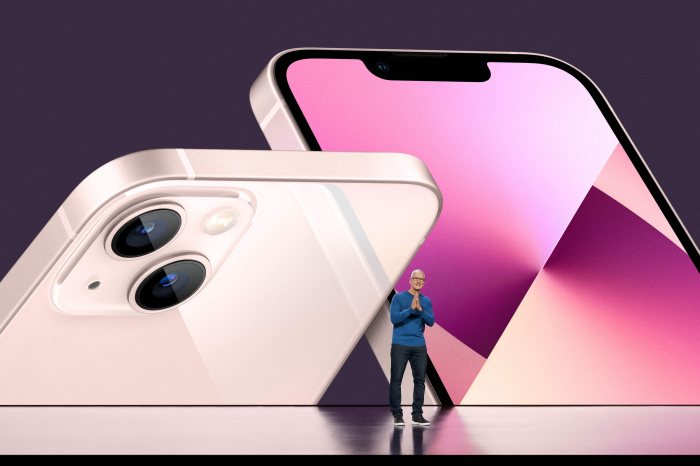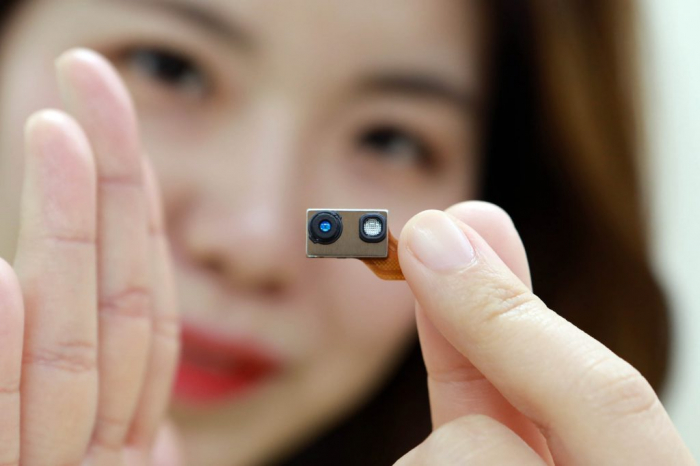S.Korean suppliers ride on Apple’s smooth sailing
The iPhone 13 series has more Korean components than its predecessors
By May 05, 2022 (Gmt+09:00)
LG Chem to sell water filter business to Glenwood PE for $692 million


Kyobo Life poised to buy Japan’s SBI Group-owned savings bank


KT&G eyes overseas M&A after rejecting activist fund's offer


StockX in merger talks with Naver’s online reseller Kream


Mirae Asset to be named Korea Post’s core real estate fund operator



South Korea's major chip, display and other electronic components makers have at least one thing in common: they all claim Apple Inc. as a key customer.
The iPhone maker sources NAND flash memory from Samsung Electronics Co. and SK Hynix Inc. For camera lenses and multilayer ceramic capacitors (MLCCs) used to store and supply electricity, Samsung Electro-Mechanics Co. is a key supplier to the iPhone maker.
Camera modules installed on the iPhone are produced by LG Innotek Co., with OLED panels for the smartphone supplied mainly by Samsung Display Co. and LG Display Co.
As Apple's share of Korean supplier shipments grows, so does its influence in the South Korean stock market.
On April 21, Samsung Electro-Mechanics' shares spiked nearly 5% on market reports that it was chosen as a supplier of substrates used in the M2 Apple chip, or a next-generation chip to be built on Mac tablets for machine learning.
To win the order, Samsung reportedly beat local rival LG Innotek.
The iPhone 13, launched in September of last year, has about 30% of its components made by South Korean companies, up from 27% for its predecessor iPhone 12 series, according to electronics industry sources on Thursday.
For the iPhone 14 model, expected to be released later this year, both Samsung Display and LG Display will reportedly remain key suppliers of OLED panels.
The supply chain disruptions exacerbated by China's strict lockdowns and soured relations between the US and China appear to have increased Apple's reliance on Korean components manufacturers, the sources said.

TAILWIND FOR LG GROUP
Apple's strong performance provides a tailwind to LG Group, which has few overlapping businesses with the US customer. Particularly, the No. 4 conglomerate in South Korea by assets has strengthened its ties with Apple after it quit the mobile phone market last year.
From August 2021, LG Electronics Inc.'s retail stores scattered across the country started serving as a key offline vendor of Apple's devices.
Moreover, if Apple jumps into the automobile market, LG Magna e-Powertrain Co. will likely supply its electric vehicle powertrains to the US tech giant, industry watchers say.
Among the LG Group units, Innotek has ramped up its shipments to Apple to as much as 75% of its total sales in 2021. That compares with 54% in 2017 and 68% in 2020.
Innotek is the exclusive supplier of sensor-shift optical image stabilization (OIS) for iPhones. Sensor-shift OIS helps the camera stabilize an image by rapidly adjusting its optical path to correct for a shaky hand or bumpy car.
"We are well aware of our heavy reliance on Apple," an LG Innotek executive told The Korea Economic Daily.
"Despite our efforts to diversify the business, demand from Apple has been growing at a rapid pace."
Innotek posted nearly 4 trillion won ($3.1 billion) in first-quarter sales, its largest ever results for the January-March period, thanks to increased shipments of its camera modules for iPhones.
For Samsung Electronics, however, Apple's strong results are a double-edged sword since Apple is its formidable enemy and big customer, too.
iPhone's brisk sales led to lower sales at Samsung's mobile phone and tablet division, while lifting sales at its semiconductor and display divisions.
Write to Nam-Young Kim at nykim@hankyung.com
Yeonhee Kim edited this article.
-
 Samsung GroupTwo unopened ways Samsung Elec. bolsters share prices
Samsung GroupTwo unopened ways Samsung Elec. bolsters share pricesMay 04, 2022 (Gmt+09:00)
4 Min read -
 The KED ViewCan Samsung Electronics ever catch up to foundry leader TSMC?
The KED ViewCan Samsung Electronics ever catch up to foundry leader TSMC?May 03, 2022 (Gmt+09:00)
4 Min read -
 Mobile networksSamsung wins US 5G equipment order from Dish Network
Mobile networksSamsung wins US 5G equipment order from Dish NetworkMay 03, 2022 (Gmt+09:00)
2 Min read -

-
 Korean chipmakersSamsung to supply chip substrate for Apple’s next-gen M2 processor
Korean chipmakersSamsung to supply chip substrate for Apple’s next-gen M2 processorApr 21, 2022 (Gmt+09:00)
3 Min read


